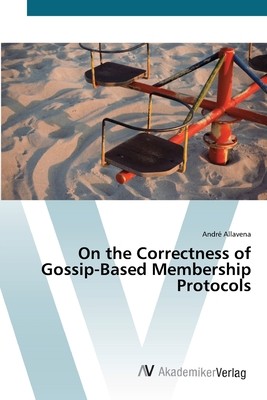
- We will send in 10–14 business days.
- Author: André Allavena
- Publisher: AV Akademikerverlag
- ISBN-10: 3639432215
- ISBN-13: 9783639432213
- Format: 15.2 x 22.9 x 0.7 cm, softcover
- Language: English
- SAVE -10% with code: EXTRA
On the Correctness of Gossip-Based Membership Protocols (e-book) (used book) | bookbook.eu
Reviews
Description
Revision with unchanged content. The importance of scalability and fault-tolerance in modern distributed systems has led to considerable research in multi-cast gossip protocols. In a gossip protocol, each node forwards messages to a small set of "gossip partners" chosen at random from the entire group membership; traditional strong reliability guarantees are traded for probabilistic guaranties, potentially yielding greater scalability and fault tolerance. Nodes only stores a small random subset of the membership as maintaining complete membership views at each node is expensive. These protocols are subtle, and while they have been the subject of much simulation and analysis, formal proofs of key properties - in particular the probability of network partitioning - have remained elusive. In this thesis we give a new scalable gossip-based algorithm for local view maintenance, with a lower bound on the expected partition time. We develop probabilistic bounds on the indegree (hence the load) of individual nodes, argue that the undirected connectivity graph is an expander and that protocols lacking our reinforcement component eventually converge to star-like networks. Heavy churn and view randomness are also addressed.
EXTRA 10 % discount with code: EXTRA
The promotion ends in 20d.03:36:28
The discount code is valid when purchasing from 10 €. Discounts do not stack.
- Author: André Allavena
- Publisher: AV Akademikerverlag
- ISBN-10: 3639432215
- ISBN-13: 9783639432213
- Format: 15.2 x 22.9 x 0.7 cm, softcover
- Language: English English
Revision with unchanged content. The importance of scalability and fault-tolerance in modern distributed systems has led to considerable research in multi-cast gossip protocols. In a gossip protocol, each node forwards messages to a small set of "gossip partners" chosen at random from the entire group membership; traditional strong reliability guarantees are traded for probabilistic guaranties, potentially yielding greater scalability and fault tolerance. Nodes only stores a small random subset of the membership as maintaining complete membership views at each node is expensive. These protocols are subtle, and while they have been the subject of much simulation and analysis, formal proofs of key properties - in particular the probability of network partitioning - have remained elusive. In this thesis we give a new scalable gossip-based algorithm for local view maintenance, with a lower bound on the expected partition time. We develop probabilistic bounds on the indegree (hence the load) of individual nodes, argue that the undirected connectivity graph is an expander and that protocols lacking our reinforcement component eventually converge to star-like networks. Heavy churn and view randomness are also addressed.


Reviews